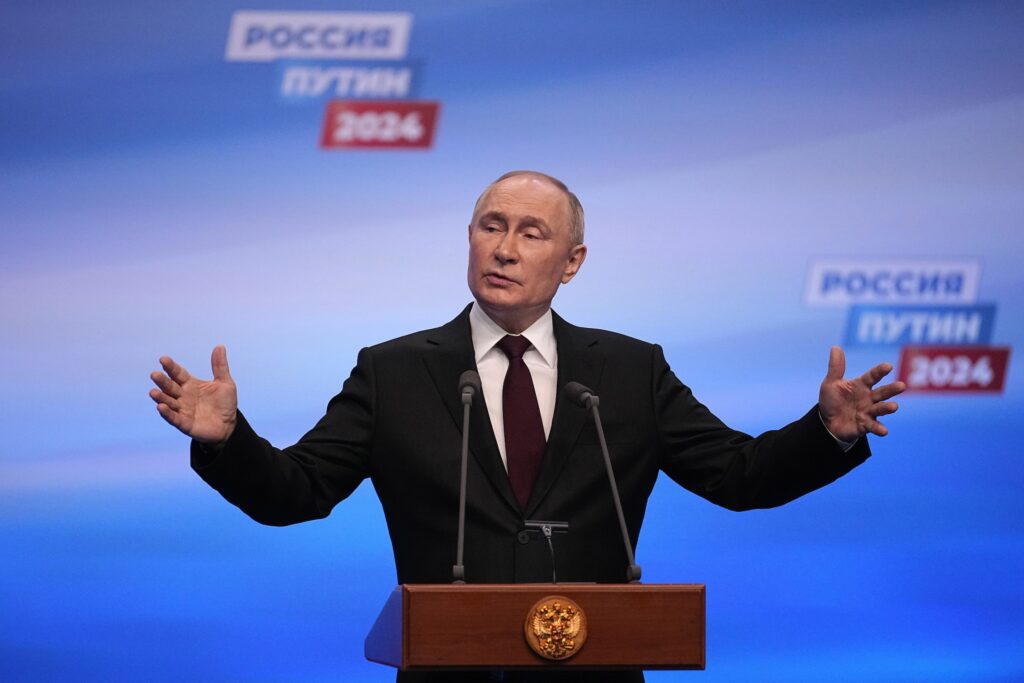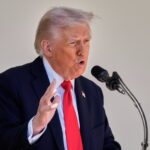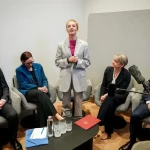
Russian President Vladimir Putin mentioned the late opposition leader Alexei Navalny for the first time in public while claiming victory in a managed election for his fifth term in the Kremlin.
“As for Mr. Navalny. Yes, he passed away. This is always a sad event,” Putin said after the polls closed in Russia. “But we’ve had other cases when people passed away in places of detention. Doesn’t this happen in the U.S.? It’s happened more than once.”
Navalny died in an Arctic penal colony last month, a deadly denouement of a yearslong story of dissidence that Russian authorities countered with an unsuccessful assassination attempt and then his imprisonment. Putin claimed that Navalny’s death occurred after the Kremlin chief had agreed to release him.

“A few days before Navalny passed away, some colleagues (not administration employees) told me that there was an idea to exchange Mr. Navalny for some people in prison in Western countries,” Putin said, per a Meduza translation. “You can believe me or not, [but] the person who was speaking to me hadn’t finished their sentence [before] I said, ‘I agree.’ But, unfortunately, what happened happened.”
Navalny’s team previously said that they were notified of a potential deal for his release in the days before his death. The late dissident’s closest associates interpreted Putin’s remarks as a confirmation that the Kremlin chief had his arch-critic killed rather than proceed with the release.
“He killed him to avoid an exchange,” said Leonid Volkov, a former Navalny aide who was attacked by a man with a hammer last week in Lithuania, an incident that authorities in Vilnius have attributed to Russia. “He’s a blood-sucking bed bug, reveling in impunity. Soon he’ll burst, and what a splatter that will make.”
Putin was careful, during Navalny’s life, not to mention the man by name in public, but he showed more rhetorical freedom while celebrating a putative victory in the latest Russian presidential election.
“Never have we seen a presidential campaign so out of line with constitutional standards,” an independent Russian election monitor organization, Golos, said Monday. “It was impossible for this election to perform its primary function: to provide an indication of the true feelings of citizens. It did not allow them to independently, freely make a decision about the future of their country.”
Russian authorities claim that Putin received 87% of the vote, but critics note that Putin banned candidates who oppose the war in Ukraine, drove countless independent journalists and media outlets into exile, and made it a crime to criticize Russia’s conduct of the war.
“The campaign was conducted in a situation where the foundational articles of the Russian Constitution, which guarantee political rights and freedoms, were essentially not in effect,” Golos said. “The culmination came on the last day of voting, when law enforcement in some regions exerted control over voters’ will, punishing them for making ‘incorrect’ marking on their ballots or showing up at the polling station to vote at the ‘wrong’ time, and even demanding they reveal their vote.”
Putin scheduled the voting exercise to coincide with the 10th anniversary of Russia’s move to cement the annexation of Crimea from Ukraine. Russian authorities claim that the people of Crimea voted to join the Russian state, but international critics noted that the vote took place under an illegal occupation. That maneuver marked the beginning of the war in Ukraine, which erupted into a full-scale campaign to overthrow the Ukrainian government in February 2022.
“I do not exclude that, bearing in mind the tragic events taking place today, that we will be forced at some point, when we deem it appropriate, to create a certain ‘sanitary zone’ in the territories today under the Kyiv regime,” Putin said Sunday.
Navalny’s widow, Yulia Navalnaya, told reporters in Germany that she wrote her husband’s name on the ballot when she voted at the Russian Embassy.
CLICK HERE TO READ MORE FROM THE WASHINGTON EXAMINER
“Of course I wrote in the name ’Navalny,’” she said. “Because it can’t be true, that Putin’s main opponent, already in prison, was killed one month before the election.”
Putin, for his part, acknowledged that he wanted Navalny gone. “I agreed on one condition: ‘We’ll [exchange] him but he cannot return, let him sit there,’” he said. “But this [death] happens and nothing can be done about it.”






